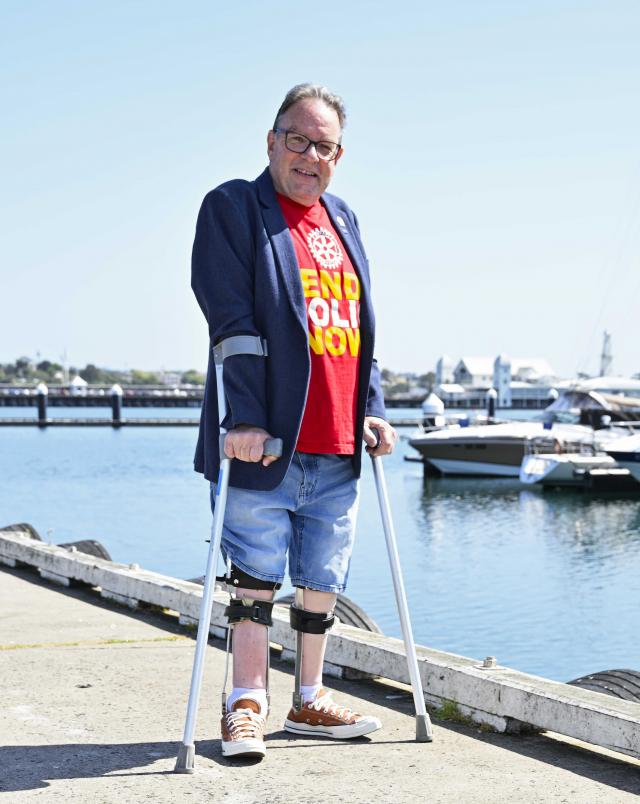As Rotary International launches the PolioPlus Society of District 9780 in Geelong on Sunday, October 1, Jena Carr speaks with Rotarian Gary Newton about his close to 70-year polio survival journey and goal to eradicate polio for future generations.
Gary Newton was a normal and healthy child close to 70 years ago in 1954 who learned to crawl, stand and walk by the time he was nine months old.
He was 15 months when he came down with a fever that turned out to be polio, a highly infectious viral disease that affects children under five and can cause paralysis.
“My youngest sister who was 12 at the time, her job when she came home from school each day was to get me out of my cot,” Mr Newton said.
“On this particular day in February 1954, she discovered that I wasn’t able to lift my arms to help her get me out of the cot. In fact, she said I was like a ragdoll.”
According to the World Health Organisation, the first successful polio vaccine, the Salk Vaccine, was created by physician Jonas Salk in 1955, a year after Mr Newton was diagnosed.
“For the last nearly 70 years, I’ve been getting around on crutches and with calipers (leg braces) because it has impacted about 95 per cent of my legs in terms of paralysis and movement,” he said.
“It has also impacted about 30 per cent of my arms at this stage, and then there’s also the late effects of polio.
“With polio, you can be paralysed quite significantly in the early stages and then reach a level of plateau where you can get on with your life.”
Mr Newton said people could do many different things and still be impacted by the disease, but that there are the late effects of polio that come with age.
“It is in many respects a resurgence of the initial symptoms. So, there’s new muscle weakness, you get a lot of fatigue, and some areas of your body can stop working,” he said.
“It is a disease that cherry picks, and it doesn’t knock out every muscle like if you had paraplegia and broke your spine. It picks and chooses here and there.”
Mr Newton said his experience living with polio was why he was “passionate about seeing it gone”.
“It’s too late for my generation of fellow polio survivors, but it’s not too late for the future children of the world,” he said.
“We can’t cure those of us who have suffered from paralytic polio, but we certainly can prevent it, and that’s what Rotary aims to do.
“We want to eradicate it from the world so that future generations will never have to worry about polio.”
Rotary International will launch its PolioPlus Society of District 9780, which includes the Geelong region, on Sunday, October 1, at 5pm, in the Novotel Hotel’s Limeburners Room.
Mr Newton said the launch coincided with October being Polio Awareness Month, and he hoped the disease would be extinct in the future, which currently only existed in Pakistan and Afghanistan.
“Absolutely anybody can come along to the launch if they’re interested in learning more about polio and Rotary’s efforts to eradicate it from the world,” he said.
“It would make it only the second ever disease to be eradicated by humanity following on from smallpox, which was eradicated back in the 1980s.
“We’re now down to seven cases this year, but back in 1988, there were 350,000 cases of polio every year, and most cases were paralytic polio that severely impacted people’s lives.
“I’m all about raising awareness and helping people understand what polio was because we don’t see it in Australia now, but we need to be aware that it was around, and we need to get rid of it.”









